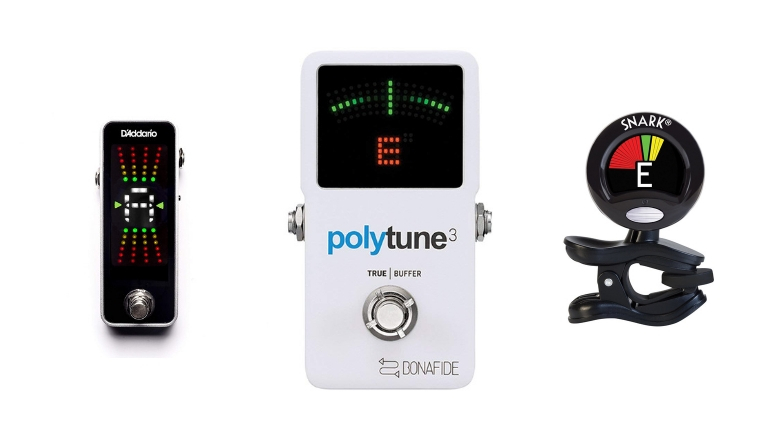
No matter what kind of musician you are, there will never be a point where it will be acceptable to be out of tune. Sure, you might be in an ultra-avant-garde outfit with prepared instruments and no real tuning, but let’s face it: even then, you’ll need a baseline. At least one reference point. Since that’s the case, tuners are incredibly important pieces of equipment for any musician.
From the time you start learning through your last album going platinum, there will never be a time when you’re far away from one. The beginner guitarist starter pack usually comes with one, which admittedly will befuddle you for awhile. But once you learn the value of them and use them often, you’ll start feeling a weird connection to these little devices, swearing by a particular make or model, and you will likely become very reluctant to give them up.
For every performance, practice, and recording, here are our picks for the best guitar tuners:
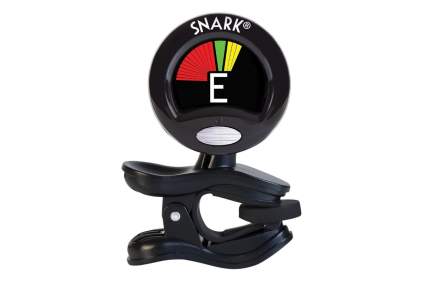
|
Amazon Customer Reviews
|
Price: $14.99 Shop at Amazon | Shop now Read our review |
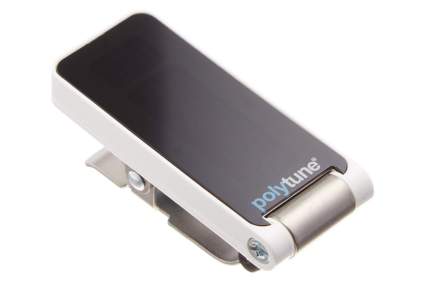
|
Amazon Customer Reviews
|
Price: $34.90 Shop at Amazon | Shop now Read our review |
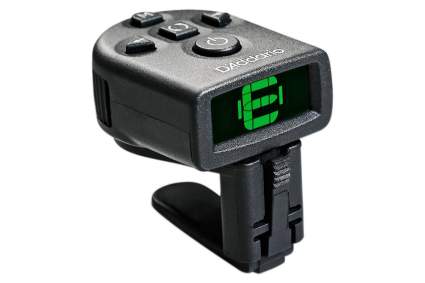
|
Amazon Customer Reviews
|
Price: $19.99 Shop at Amazon | Shop now Read our review |
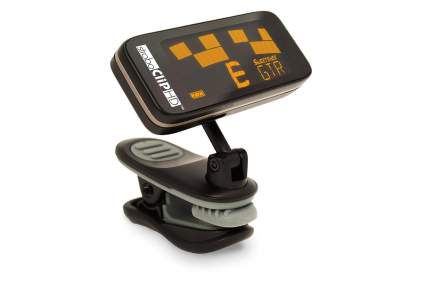
|
Amazon Customer Reviews
|
Price: $59.99 Shop at Amazon | Shop now Read our review |
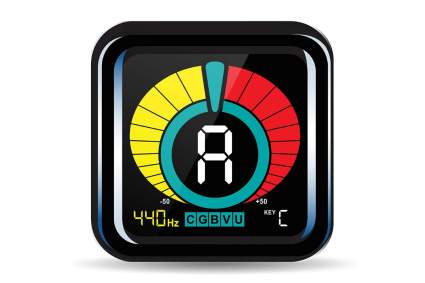
|
Amazon Customer Reviews
|
Price: $24.49 Shop at Amazon | Shop now Read our review |
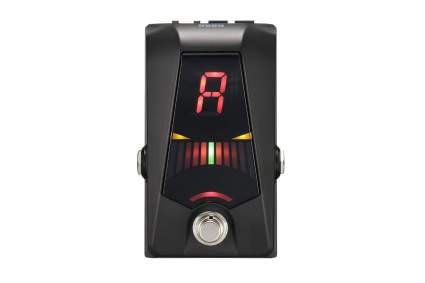
|
Amazon Customer Reviews
|
Price: $125.00 Shop at Amazon | Shop now Read our review |
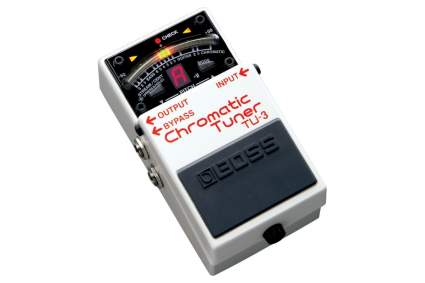
|
Amazon Customer Reviews
|
Price: $98.50 Shop at Amazon | Shop now Read our review |
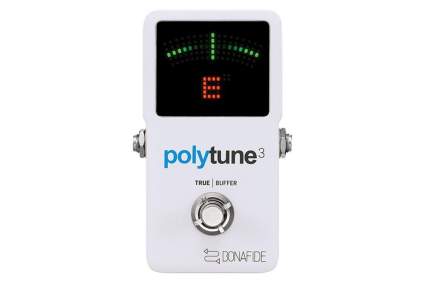
|
Amazon Customer Reviews
|
Price: $65.50 Shop at Amazon | Shop now Read our review |
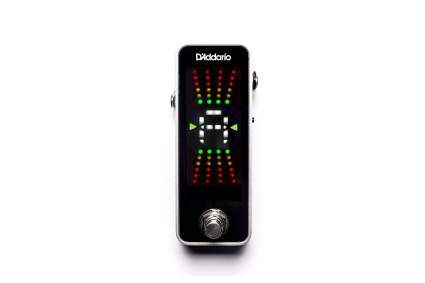
|
Amazon Customer Reviews
|
Price: $114.99 Shop at Amazon | Shop now Read our review |
-
1. Snark SN5X Clip-On Tuner
Pros:- Excellent screen
- Clips snugly to headstock for accurate, vibration-based tuning
- Screen swivels for best viewing angle
- Fast response
Cons:- Green indicator light section very large and may leave room for pitch error
- If you have an old Snark, this model may not be an improvement
- May not be very durable
- Multiple models make purchasing confusing
My first recollection of a clip-on tuner is a Snark model of some sort. My local guitar shop had them up on the counter and I was pretty amazed by them at the time. They remain one of the most popular options for clip-on tuning. The screens are super crisp and bright and the response times are very fast. When choosing a Snark, you have many options, so shop carefully. The SN5X is the latest model meant for guitar, bass, and violin.
You can also opt for any of the ST- models, which means Super Tight, and promises better accuracy. The HZ models include hertz tuning mode for ultra-accurate readings. The SN-11 purports to be for all instruments, while the SN-2 has a tap tempo metronome on board. All in all, this option is probably best suited to something stringed with a headstock, which are the frequencies it likes best.
Consider searching for this on Reverb to find used examples or sell your gear toward a purchase.
-
2. TC Electronic PolyTune Clip
Pros:- PolyTune technology allows you to tune all strings at once
- Bright, easy to read screen
- Flat tuning and capo modes
- Stainless steel clip
Cons:- Expensive
- Guitar-focused
- Screen doesn’t swivel
- Must be manually switched between guitar and bass modes
Even newer than clip-on tuners in general is TC Electronic’s innovative PolyTune technology. It lets you strum all six strings at once and accurately tune them. In chromatic mode, this means +/- .5 cents and in strobe mode, +/- .02 cents, which is about as good as it gets. Reviewers note that it’s every bit as good as the pedal version that appears a bit later on our list.
It’s also very small and tough, so you can leave it on your headstock throughout the gig without fear. This is the advanced option, as the price indicates, although it isn’t the most expensive one on our list. People swear by this one, so if you’re frustrated with others or ready to graduate, look here.
Consider searching for this on Reverb to find used examples or sell your gear toward a purchase.
-
3. D’Addario NS Micro Clip-On Tuner
Pros:- Ultra compact design hides behind headstock
- Very inexpensive
- Extremely accurate
- Visual metronome
Cons:- Somewhat difficult to read
- Can be difficult to situate on three-on-a-side headstocks
- Adjustable mechanism isn’t meant to be taken off often
- Tuning bars aren’t as subtle as other tuners
First appearing in our list of the best gifts for musicians, this little marvel focuses on being the tiniest clip-on tuner on the market. Unlike some of the other options, this one will work just as well on a mandolin as it does a guitar, and is cheap enough that you could pick one up and slap one on each of your instruments permanently. The unit’s connection to the instrument is a bit more solid, which promotes greater accuracy.
If you play acoustic, D’Addario makes a very similar unit for the sound hole, which is easier to see and won’t compete with tuning machines.
Consider searching for this on Reverb to find used examples or sell your gear toward a purchase.
-
4. Peterson StroboClip HD Strobe Tuner
Pros:- 28 tuning settings, including Eastern and Buzz Feiten
- Large, easy-to-read screen
- Strobe readout allows for very accurate readings
- Quick response
Cons:- Expensive
- Possibly over the top for most players
- Large screen means it won’t be hidden
- Better for studios and workbenches than live
If you need the deluxe treatment, this might just be it. This unit is a high-end, do-it-all clip-on device, capable of utilizing 28 so-called “Sweetened Tunings” to cover a very wide variety of needs. It even includes a setting for the Buzz Feiten Tuning System for you niche players.
The strobe display is meant to give you very accurate readouts, which are easy to see on a screen this large. It’s aimed at precision, so you’ll probably want this for your recordings and setups more than you’ll want it for the stage, but you have the option, nevertheless.
Consider searching for this on Reverb to find used examples or sell your gear toward a purchase.
-
5. KLIQ UberTuner
Pros:- Ultra clear screen
- Multi-adjustment allows for many screen angles
- Three-year warranty
- Transposition settings for various instruments
Cons:- Relatively large
- May have trouble registering some strings on bass
- Accuracy may be wanting
- Big clip may have trouble on some headstocks
The spiritual successor to the Snark, this takes up the cue of the bright and colorful screen. The manufacturer suggests that it’s made to be tough and road-ready, which appears to be reinforced by the sheer girth of the thing. The three year warranty helps, too.
Otherwise, like the other clip-ons, this is a microprocessor and a piezo put together, and includes the hertz readout as well as pitch calibration and transposition. This one also appears to have a slightly quicker response than some of the others, which could be useful in live settings.
Consider searching for this on Reverb to find used examples or sell your gear toward a purchase.
-
6. Korg Pitchblack Chromatic Tuner
Pros:- Multiple tuning modes
- True bypass
- Easy-to-read display
- Rugged enclosure
Cons:- Some units pop when switched on
- Difficult to see in direct light
- Slow to register
- Pitch indicator somewhat jumpy
I relied on a Korg tuner for the first few years of playing guitar. While that simple little unit was up to the job, it pales in comparison to this beast. This is a true bypass tuner with a bright, easy-to-read display that offers four modes. Meter mode is the familiar tuner operation where the indicator moves to center as it gets closer to being in tune. Full strobe illuminates the entire display continuously toward sharp or flat, while half strobe illuminates only the side indicating the direction in which the pitch is off. Mirror mode moves two LEDs toward each other until the string is in tune.
It’s a fantastic unit that was developed with stage use in mind. For a little more, you can get the polyphonic version, which, like the TC Electronic PolyTune, allows you to tune all strings at once. You can also get it in mini format, too.
Consider searching for this on Reverb to find used examples or sell your gear toward a purchase.
-
7. Boss TU-3 Tuner Pedal
Pros:- Chromatic and guitar/bass modes
- LED brightness control
- Accu-Pitch function
- Flat tuning mode
Cons:- Not true bypass
- Hard to read
- Mode switch is easily flipped accidentally
- Better for stage use than studio or home
The Boss installment on this list is a legend. Some folks swear by this and will get twitchy if you suggest that they use anything else. The TU-3 will certainly appear in the annals of pedal history if it’s ever discontinued. It’s basically everything we’ve discussed about a solid Boss tuner, only this one uses 21 lighted segments to indicate pitch movement. It does the clip-on Boss tuner one better by offering six semitones below standard pitch for flat tuning.
One possible consideration for this is that it isn’t true bypass, and is buffered. This can be advantageous when placed at the very beginning of your pedal chain, a concept we discussed in detail here. If you’re in need of both a buffer and a tuner, this is certainly the way to go. Otherwise, it’s a touch expensive for what it is, so I’ve taken the liberty of linking to a bundle that includes four cables for a little added value. Realistically, you can’t go wrong here as this pedal has more than proven its worth over the years.
If you love the TU-3 but wish it was true bypass, opt for the TU-3W Waza Craft, which is switchable between buffered and true bypass modes. The circuitry is apparently improved, as well, but watch the price. There’s also the TU-3s, which is a more compact version, if you need the space.
Consider searching for this on Reverb to find used examples or sell your gear toward a purchase.
-
8. TC Electronic PolyTune 3
Pros:- +/- .1 cent accuracy
- Very clear display
- Polyphonic tuning
- Built-in Bona Fide buffer
Cons:- Opposite of the Boss, may be slightly better in studio settings
- Pop can occur during switching
- Some reviewers find disagreement between polytune mode and single string tuning
- In some applications, you may hear a beeping or clicking as it searches for the note
Available in both standard and mini configurations, the Polytune 3 is the bigger brother of the clip-on version. Using an all-analog circuit, this gives you access to the polyphonic tuning capabilities TC Electronic developed and brought to the market. Version 3 adds the company’s Bona Fide buffer to the otherwise excellent tuner for those with super long cable runs and dozens of true bypass pedals.
The buffer will return rolled off high end to your signal, if you should need that. The strobe mode is super-precise and the LEDs are extremely bright. If the polytune mode doesn’t work for you, you might want to look elsewhere, as that’s pretty much this unit’s calling card. Takes up very little space on your board considering its technological prowess.
If you don’t need the buffer, opt for the Polytune 2 Mini.
Consider searching for this on Reverb to find used examples or sell your gear toward a purchase.
-
9. D’Addario Chromatic Pedal Tuner
Pros:- Rugged steel frame
- Super fast response
- True bypass
Cons:- Despite the large screen, not as clear as other options
- Some find the tuning jumpy
- Not as compact as some other options
Taking a unique approach to a mini tuner, this option from D’Addrio combines a few key features. First is the rugged steel frame, into which is set a large, full-color display. There’s a 32-bit processor inside, much like a tablet, which allows for super fast response.
It’s compact, which is a good choice for a utility pedal like this. It’s also true bypass and can be powered with a standard Boss-style power adapter or a 9V battery.
Consider searching for this on Reverb to find used examples or sell your gear toward a purchase.
Find more D'Addario Chromatic Pedal Tuner information and reviews here.
Guitar Tuner Styles
Clip-On Tuners
This style is among the more recent innovations when it comes to tuning. Combining a tiny version of the box tuner with a clamp, they pick up very quiet vibrations, making them super useful in loud settings.
They're also smaller and some of them can easily be hidden behind the headstock during an entire performance, so perfect pitch is available on the fly. These are a great choice for acoustic guitar players who might otherwise have no need of a cord and whose instruments are generally more resonant.
Pedal Tuners
As the clip-on tuners are to acoustic players, so are pedal tuners to electric players. Really, anyone possessing a cable can make excellent use of pedal tuners, the better versions of which are ultra-accurate and often have a vaunted position on a player's pedalboard. Part of the function of a pedal tuner is to mute the signal during tuning, which your listening public will appreciate. They're made for the stage, so displays tend to be bright and easy to read at a distance.
Other Tuner Options
Another option is this really cool Roadie 2 Automatic Guitar Tuner ($129). It works by selecting one of eight preset tunings and then fitting the slot over the tuning machine. The unit does the rest, bringing the string perfectly into pitch. It's a very cool innovation that doesn't require any work on your part and will perform even in less-than-ideal settings.
You could also always just get an old fashioned pitch pipe and get gud.
See Also: